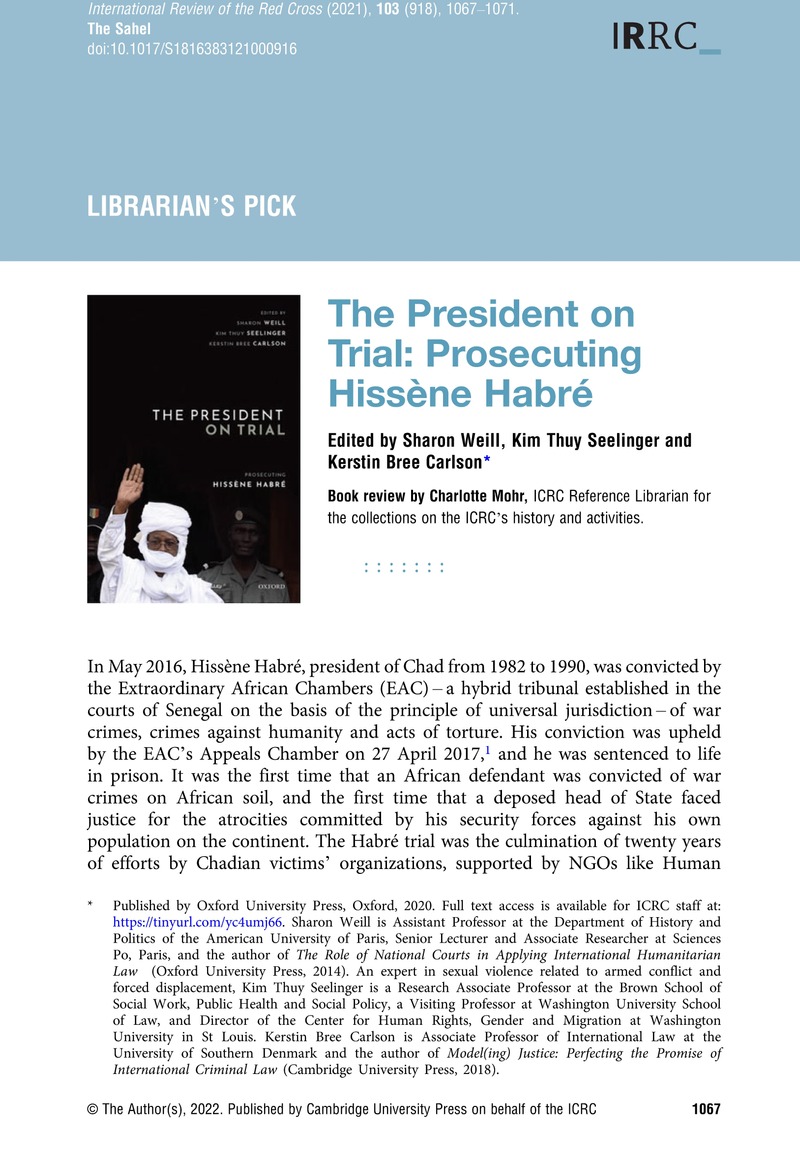No CrossRef data available.
Published online by Cambridge University Press: 21 April 2022

Published by Oxford University Press, Oxford, 2020. Full text access is available for ICRC staff at: https://tinyurl.com/yc4umj66. Sharon Weill is Assistant Professor at the Department of History and Politics of the American University of Paris, Senior Lecturer and Associate Researcher at Sciences Po, Paris, and the author of The Role of National Courts in Applying International Humanitarian Law (Oxford University Press, 2014). An expert in sexual violence related to armed conflict and forced displacement, Kim Thuy Seelinger is a Research Associate Professor at the Brown School of Social Work, Public Health and Social Policy, a Visiting Professor at Washington University School of Law, and Director of the Center for Human Rights, Gender and Migration at Washington University in St Louis. Kerstin Bree Carlson is Associate Professor of International Law at the University of Southern Denmark and the author of Model(ing) Justice: Perfecting the Promise of International Criminal Law (Cambridge University Press, 2018).
1 With one notable exception: a case of personal commission of rape, of which he was acquitted on procedural grounds.
2 In particular, the lack of distribution of the retributions awarded to victims, to this day, is mentioned by many of the volume's contributors. The lack of cooperation with the EAC by Habré also raises questions relative to the rights of the defence.
3 The absence of Habré's chosen counsel as well as of Senegalese and Chadian government officials is mentioned up front with regret by the editors. The defence's perspective is explored in a contribution by Hélène Cissé (“Defending Hissène Habré in Senegal during the Early Years”), who participated in Habré's defence in 2000–01 before the criminal court in Dakar, and in a chapter by Mounir Ballal (“Defending Habré”), one of Habré's court-appointed lawyers at the EAC. It is also represented in an excerpted testimony that sees Daniel Fransen, Belgian investigating judge, answer Mounir Ballal's questions (“The Belgian Investigation of the Habré Regime: Excerpt of Trial Testimony by Daniel Fransen, Belgian Investigating Judge”). To include the voice of Hissène Habré himself – as he remained silent during the trial, refusing to recognize the legitimacy of the EAC and to collaborate with his court-appointed lawyers – the editors have included excerpts from his 2011 interview with Senegalese reporters from the newspaper La Gazette (“In His Own Words: An Interview with Hissène Habré”).
4 See Brody, Reed, “Tenacity, Perseverance, and Imagination in the ‘Private International Prosecution’ of Hissène Habré”, in The President on Trial, pp. 39–47Google Scholar.
5 The President on Trial, p. 2.
6 See Judge Jean Kandé, “Investigations in Senegal and Tchad: Cooperation and Challenges”, in The President on Trial, pp. 81–89.
7 See Petit, Franck, “Outreach for the EAC”, in The President on Trial, pp. 186–193Google Scholar.
8 See Guengueng, Souleymane, “Documenting Crimes and Organizing Victims in Chad”, in The President on Trial, pp. 31–38Google Scholar. Guengueng is the founder of the Association of Victims of Political Repression in Chad, a civil party in the Habré trial, and director of the Souleymane Guengueng Foundation.
9 See Jacqueline Moudeina, “From Victim to Witness and the Challenges of Sexual Violence Testimony”, in The President on Trial, pp. 118–124. The first woman to practice law in Chad, Moudeina was the victims’ legal counsel before the EAC and is the former president of the Chadian Association for the Promotion and Defence of Human Rights.
10 See Jacobs, Dov, “Hybrid Justice and the Rights of Defence: Existence at the Periphery”, in The President on Trial, pp. 252–264Google Scholar.
11 See Williams, Sarah, “Hybrid Courts and Amicus Curiae Briefing”, in The President on Trial, pp. 351–364Google Scholar.
12 See Kim Thuy Seelinger, Naomi Fenwick and Khaled Alrabe, “Can We Be Friends? Offering an Amicus Curiae Brief on Sexual Violence to the EAC”, in The President on Trial, pp. 134–141.
13 See Ndiaye, Ndeye Amy, “The Habré Trial and the Malabo Protocol: An Emerging African Criminal Justice?”, in The President on Trial, p. 240Google Scholar, referring to Christophe Châtelot's thesis in his article, “La condamnation de Hissène Habré: Un précédent sans lendemain?”, Le Monde, 24 May 2016.